The second episode of Frontline 2012 where I interview Dr. Abu Sakara of the CPP is now available on the TV3webteam YouTube channel.
What do you think?
The second episode of Frontline 2012 where I interview Dr. Abu Sakara of the CPP is now available on the TV3webteam YouTube channel.
What do you think?
Over the last week or so, the music video of “Uncle Obama” with Sister Deborah has been moving round the social media sites like wildfire here in Ghana. Already from the title of the song, we can hear that it’s beckons attention and after just a few seconds of watching, we realize what kind of attention that is…( if you haven’t seen it, and hence do not know what I am getting at, the next line goes “I like the size of your banana”…).
Everybody has an opinion about this song, some say it is cheeky or catchy, others say it is controversial or that Sister Deborah should act instead of sing! I have also heard comments along the line of that artists with resources should have a message instead of just joking around.
Regardless of what you think of the song, I believe there are several things we can learn from this video.
All of this could come together to create and promote many more Ghanaian music videos that actually gets watched world wide with very little effort. Another example of the same “silly song” phenomenon is the Korean Gagnam Style music video that I also cannot get out of my head… Again a premium production of a very silly song… The other day, a friend was saying how the local Ghanaian Azonto craze never really caught on in other parts of the world,but what if someone would do a high quality video, throw in some cameos and start hitting the social media sites. I have seen on Twitter that all messages mentioning the “Uncle Obama” song are retweeted or responded to, for instance. That goes a long way for creating a hype.
Finally, we can learn that people like silly dances they can copy, but maybe Sister Deborah went just too far there. I am yet to see someone copying her “size of your banana”-move. Or have I just been spending too much time in the office?
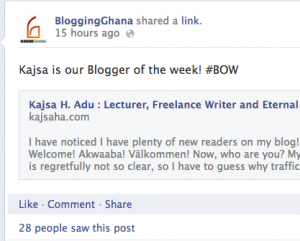 This week, I am featured as BloggingGhana‘s Blogger of the Week, BOW for short. So what does being BOW entail?
This week, I am featured as BloggingGhana‘s Blogger of the Week, BOW for short. So what does being BOW entail?
Well, first of all, it is a highly prestigeous nomination! I am only the third blogger in Ghana to be granted this honor! Earlier BOWs are Nana Darkoa/Adventures from the Bedrooms of African Women and Ato/Mighty African. It involves the group highlighting my blog on their Facebook page and on Twitter (@BloggingGhana), sharing selected blog posts (so far, they have picked up on when I saw Obama and a very special love story). I will also contribute with a post on why I blog and on Friday, there is a live “Twitterview” where questions people have posted on Facebook or Twitter will be put to me!
What would you like to ask me?
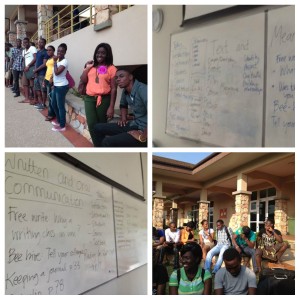 This fall, I am teaching two classes, Written and Oral Communication and Text and Meaning. Both classes are part of Ashesi University College’s liberal arts core and both are offered to our first year students.
This fall, I am teaching two classes, Written and Oral Communication and Text and Meaning. Both classes are part of Ashesi University College’s liberal arts core and both are offered to our first year students.
I really enjoy teaching these communications classes and have together with my colleagues Kobby and Frimpong created two intense syllabi full of writing assignments, readings and speeches/presentations. We are for instance reading Chimamanda Ngozi Adichie’s shortstory A Private Experience, doing a speech in the Ghana Decides Tag series style to be presented in video format and doing free-writing almost every class! We will also go for study visits, have guest-speakers and write a final paper!
My students are all really cool, lively and talented and have already amazed and inspired me, I also work with a fun and helpful team – hence I am looking forward to an intense semester of communication!
Collage made with Pixlr.
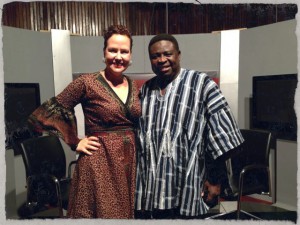 On Friday, I did my second Frontline 2012 interview. This time, I had Dr. Abu Sakara of the CPP in the studio and the initial nerves from the maiden broadcast were gone.
On Friday, I did my second Frontline 2012 interview. This time, I had Dr. Abu Sakara of the CPP in the studio and the initial nerves from the maiden broadcast were gone.
Some other things were also different this time, for instance, we had to change studios as Ghana is going through a power sharing exercise due to damages on the West Africa Gas Pipeline, but I guess that is another blogpost…
Many of you want to view the interviews online. The TV3 team is working on putting the show on YouTube or similar, in the meantime, let me share some comments from viewers on Twitter:
https://twitter.com/joshua__ADJEMAN/status/251806289297035264
@kajsaha congratulations on presenting the show! You look great
— Abster (@abena_serwaa) September 28, 2012
https://twitter.com/Twenebowa/status/251783565765922816
@kajsaha you look beautiful. Looking to watching the episodes on youtube.
— Dela Doe (@EcomMama) September 29, 2012
@kajsaha and ya better add Interviewer/ Broadcaster after/New friend? BRAVO! BRAVO!
— chris scott (@madinghana) September 29, 2012
Next week, Dr. Papa Kwesi Ndoum of the PPP is my guest, if you have questions for him, you can tweet or post them as comments here.
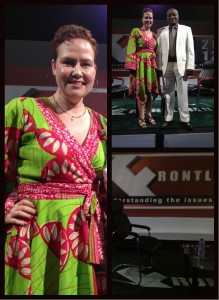 On Friday, the first program in the Frontline 2012 series was broadcast.
On Friday, the first program in the Frontline 2012 series was broadcast.
The program is a one hour political interview aiming to clarify the issues for the Ghanaian voter in the 2012 elections. Mr Hassan Ayariga of the PNC was my first guest and, save for a technical problem during the first minutes of our transmission, it went well.
I am hoping to be a ble to share a clip with you sometime soon, but for now you have to make do with these pics from the set.
Next show, Fri 28 Sept 2012 at 8.30 PM on TV3.
What questions do you have for this election’s presidential candidates?
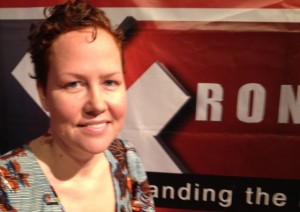 As I am writing this, I am seated in the busy newsroom of TV3, a news printer is scrieching in the back, assignments are given out “Kweku, take a camera and go to…” and stories about parties, school girls and social media are debated. This week, a new and exciting chapter in my professional life starts as a TV host of TV3’s new political program, Frontline 2012.
As I am writing this, I am seated in the busy newsroom of TV3, a news printer is scrieching in the back, assignments are given out “Kweku, take a camera and go to…” and stories about parties, school girls and social media are debated. This week, a new and exciting chapter in my professional life starts as a TV host of TV3’s new political program, Frontline 2012.
It is a one-on-one show with prominent personalities, predominantely politicians, in this year’s Ghanaian election. It airs every Friday at 8.30 pm and lasts for an hour, with breaks for commercials.
I decided to do this as I have been following the election closely through BloggingGhana’s flagship project GhanaDecides and see this as an opportunity to ask the questions Ghanaians care about to the people who can answer them and provide a steady focus on understanding the issues at hand.
Come Friday, I hope you will watch Frontline 2012!
Our daughter is now 13,5 months and everyday with her is like a month. She learns a lot, she is so funny and also runs around with a speed that makes me feel tired after just a few minutes. I have been asked how she dealt with the travel this summer.
The answer is that she took it very well even though we visited many new places and people. We were on the road for a month, and upon our return to Ghana she needed just a couple of days before she was fully reintegrated into Ghanaian everyday life, see below!
Click on pic to see it in full!
Edited with Pixlr.
On Friday, Jarreth Mertz came to show his documentary An African Election to a sizable crowd in Accra. I have been wanting to see the film on the 2008 elections since I first heard about it and only watching the trailer (see below) made me want to show it to my students. So how was it?
The film was funnier than I had expected, the crowd actually soared with laughter many times during the 89 minutes of the film, but also more serious. The unrest was so close to the surface and the filmmakers were in the midst of all the drama, the mega crowds, the closed rooms, it seemed. Finally, the film was also more beautiful than I had imagined. It was filled with interesting angles, sharp, sharp images and our dusty, sometimes ragged, country came out as a piece of unrefined gold.
Ayekoo Mertz brothers!
Next the film will tour Ghana under the Political Safari flag. I hope it will make a stop at Ashesi! Updates to come!
 Last Wednesday evening, there was a book reading at a coffee house and bookshop in downtown Accra. I have been busy ever since, but still wanted to write something about it. So better late than never, here it is.
Last Wednesday evening, there was a book reading at a coffee house and bookshop in downtown Accra. I have been busy ever since, but still wanted to write something about it. So better late than never, here it is.
The Accra literary crowd is not spoilt with world renowned authors coming to share their work, so it was an exciting evening. Author Nii Ayikwei Parkes, fulfilled most of our expectations. “Literature is a way to have fun”, he mused. With a clear voice and a warm smile, he read his Spoken Word poetry, sang some lines from a favorite song and shared highlights – with some extra italics – from his book the Tail of the Blue Bird (a Ghanaian crime novel that I loved, and I don’t easily warm up to this genre. Maybe this is another post, though).
The discussion that ensued touched on many different topics, but in the center was issues about editorial concerns about readers’ capacity to understand African literature (names, expressions, contexts), the localization of language and Parkes way of using italics to highlight Akan words and expressions in his book.
Parkes, book bloggers Kinna Reads and Accra books and things in blue and other guests at the Sytris book and coffee shop in Osu.
Maybe the most rewarding thing with the event, apart from meeting a wonderful writer, was that in the crowd I know we had some of the next authors out of Ghana!
 Tuesday and Wednesday, I went to a conference “Migration and Development: Opportunities and Challenges in a Globalized world”. It was a great experience in many ways – inspiration, networking and the personal growth that comes with sharing your work.
Tuesday and Wednesday, I went to a conference “Migration and Development: Opportunities and Challenges in a Globalized world”. It was a great experience in many ways – inspiration, networking and the personal growth that comes with sharing your work.
To me, it is always inspiring to learn about research that is ongoing some favorite new aspects of migration involved gold scams in Ghana, changing migration patterns of unskilled labor to Accra (kayayeis, scrap collectors and others) and student migration out of the Congo finding new destinations.
The networking was superb – I met with many graduate students at University of Ghana – as migration naturally is interdisciplinary we never knew of each other! We have exchanged contacts and will meet up again soon. Also, in the main frame of the collage above, I met with a former lecturer to Nigeria’s president, Goodluck Jonathan!
Finally, the pressure that comes with synthesizing your work and presenting some aspect of it feels horrible, but I am convinced it is good for me. I presented a paper in progress about the migration policies of the north and their impacts on academe in the global south, naturally with a focus on Ghana.
Later this year, a publication from the conference will be put together. If my work meets the quality target (and I manage to submit in time), I will tell you more!
See more of my photos from the conference here.
I am happy to introduce my first guest writer on this blog. This guest post is written by fellow graduate student Kwaku Ananse, one of my readers:
Just like most things in life, conventional wisdom posits that graduate school life is a linear process: you apply to the program of choice, you get accepted, you take and complete core and pertinent elective class classes, pass all those classes mostly with As (and Bs), and then you focus on completing your proposed thesis or dissertation. Even within the process of completing the thesis/dissertation, the accepted thinking posits that those committee members you select are the ones that eventually lead you to the finish line.
However, within my experience, being a ‘traditional graduate student’ who wants take the routine routes to complete a program should reassess such taken-for-taken ideas. One should realize that your supervisor most likely will not be the ‘ideal’ supervisor to deliver on the assumed responsibilities that he/she is supposed to provide.
There are many problems relating to why responsibilities are not fulfilled:
Another reason to always be wary of the traditional route comes in the guise of ‘just complete your course work and dissertation advice’. Such advice doesn’t take cognizance of recent trends. Nowadays, having a transcript, a diploma/certificate and a dissertation under your armpit doesn’t cut it (unless of course, you already have a job security in a university/college).
In our times, employers want graduates with experience, widely interpreted either as teaching, research experience as evident in a publication, or both.
So, what should we do? Look out for Kwaku Ananse’s next blogpost.